Sarah experienced about six major surgeries during the first three years of her life. Several of them involved separating her little “mitten hands,” as we affectionately referred to them, in an orthopedic surgery called syndactyly release.
Because fine motor skills are crucial to early childhood development, her orthopedic surgeon, Dr. Sood, recommended that he and his surgical team first separate the pointer digit on each hand, and once those healed and Sarah learned how to use them for the pincer grasp through occupational therapy exercises, then he would separate the pinkie fingers, and finally the middle two fingers.

Sarah asks questions about her hands off and on these last few years, mainly because she is curious as to why they look and operate differently than the rest of us. The first time she even noticed her hands weren’t like ours was when she was in kindergarten and one of the boys she went to school with asked her, “Why do you have baby hands?”
She came home crying, which opened the conversation about why her fingers are different.
This is a common feature of Apert syndrome—fused fingers and toes—and everyone who is born with this diagnosis will go through orthopedic surgeries to “create” as many digits as possible to form five on each hand. Some people only have four, however, because the fusion of bone and cartilage is almost always complicated.
Sarah was fortunate to have five distinct phalanges on each hand, as indicated by several x-rays and scans that Dr. Sood shared with us before we agreed to the first surgery. His team did a fantastic job of making Sarah’s fingers both appear and operate as “normally” as possible, but she does not have the ability to bend her fingers at the first or second joints, only the knuckles, and her thumbs are considerably smaller than what most of us have.
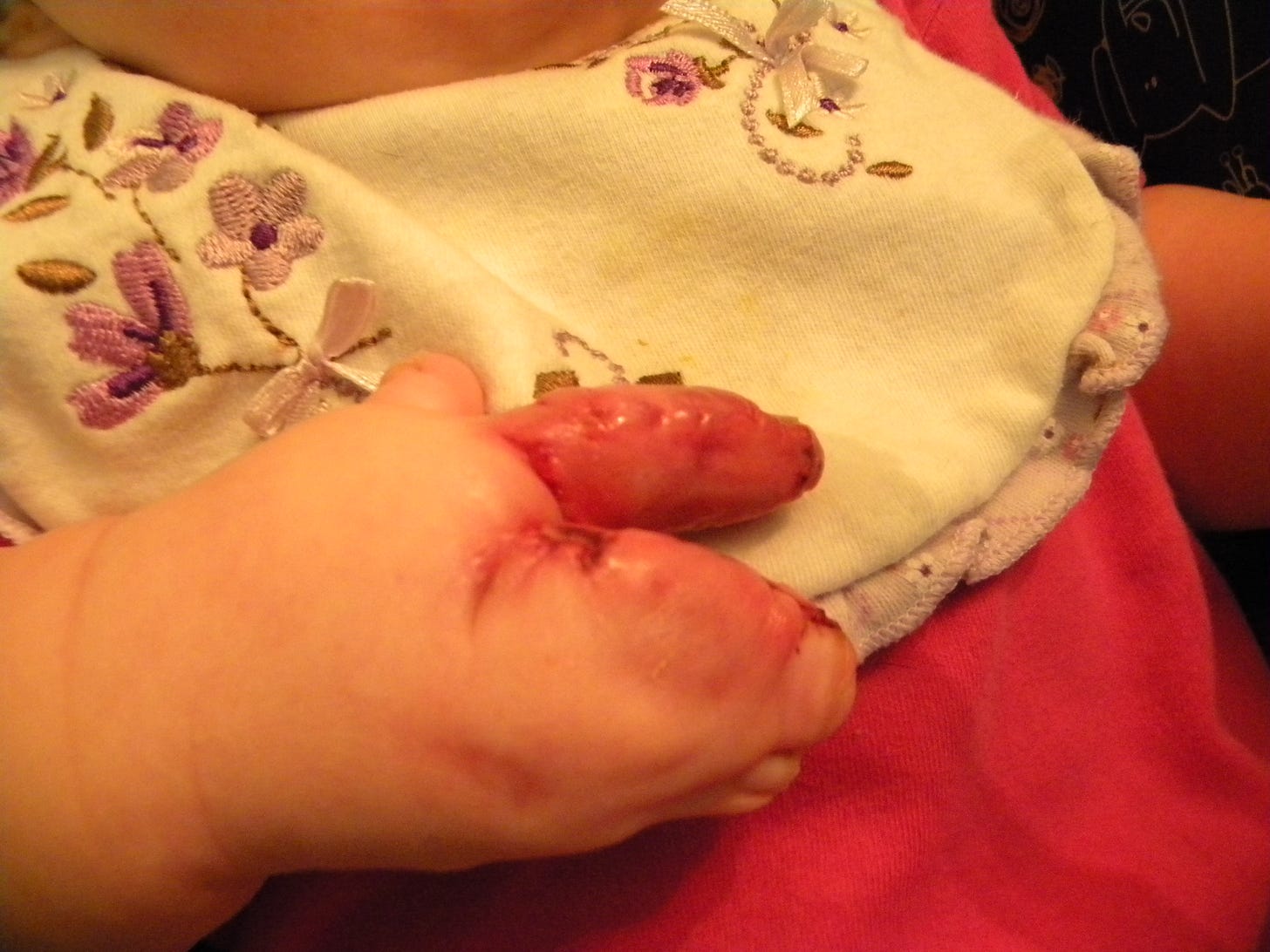
I never realized how complicated this type of surgery could be, until Ben and I learned what post-operative care would entail: mainly changing of dressings daily, replacing layer upon layer of antibacterial ointment, gauze, something called Tubigrip (which resembles a rubber thimble), and a customized compression garment that fit snugly over Sarah’s hand with a hole for her “new” finger (in order to prevent the skin grafting from growing back together and forming webbing in between her fingers).
Daily, I had to massage her hands in order to heal the scar tissue. Ben and I were diligent to avoid contamination so that she would not catch an infection that could lead to serious post-operative injury or complications that would require a re-do.
Today, Sarah’s fine motor skills are remarkable, and her handwriting and drawings are beautiful!
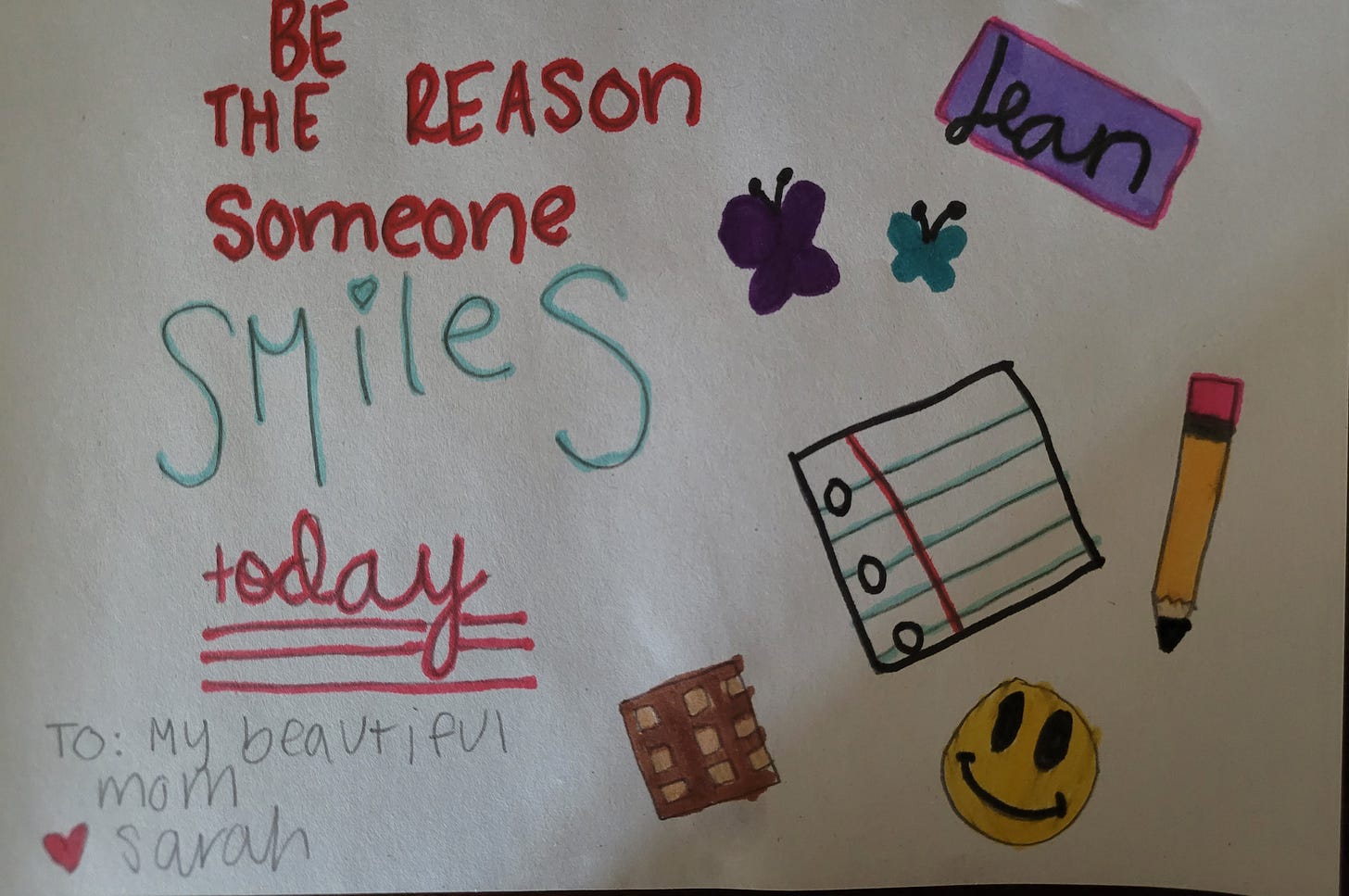
Sarah truly enjoys sharing her life with all of you, and I want you to know what your support means not only to me, but to our entire family. Her counselor told me that these videos are helping Sarah’s self-confidence, as well as developing necessary social skills that are hard for her, because she is also autistic.
My goal is to continue sharing whatever Sarah wants to share, and to allow her to guide the conversations she is ready to have with all of you on a public level. We plan to post videos once a week, maybe a little less, depending on what she wants to do. My hope is that these will give you a glimpse into her world and what it’s like to be a person living with Apert syndrome.
Because I am Sarah’s full-time primary caregiver, I spend about twenty hours of unpaid work per week for her ongoing care. This includes driving to and from appointments, filling out paperwork, attending case management meetings and meetings for her IEP/educational needs, coordination of care, medication management, and continual communication with her fifteen specialists.
If you feel compelled to become a paid subscriber, your contribution will help offset the costs accrued from these caregiving hours. You will help me continue to share both Sarah’s and our family’s stories to spread hope and kindness in this dismal society.
Five dollars per month really does make a difference. Even a one-time donation is greatly appreciated. No matter whether you can or cannot become a paid subscriber, know that your presence here means a great deal to Sarah and to me.
We appreciate you. Thank you for taking this journey with us and for all of your thoughtful comments.
Transcript of video:
(00:00:01):
Hi.
(00:00:01):
Hi everyone.
(00:00:02):
So Sarah decided she wants to talk about one of her surgeries today and she might
(00:00:08):
ask some questions,
(00:00:09):
right?
(00:00:09):
And just tell us what it was like for her.
(00:00:12):
So which one did you want to talk about?
(00:00:14):
Fingers.
(00:00:15):
Your fingers.
(00:00:16):
Okay.
(00:00:17):
So a few minutes ago,
(00:00:18):
I showed Sarah some pictures of some of her major surgeries because most of them
(00:00:24):
happened before she was three years old.
(00:00:26):
So she saw pictures of when her first,
(00:00:29):
her pointer fingers were separated from the rest of her fingers.
(00:00:32):
So what did you want to talk about or ask me?
(00:00:34):
You were there?
(00:00:37):
Yeah, Dad and I both were there.
(00:00:38):
Why?
(00:00:38):
Because we love you.
(00:00:40):
Who else was there?
(00:00:42):
Just Dad and me.
(00:00:44):
Well, the doctors.
(00:00:45):
Well, yeah, the doctors did the surgery.
(00:00:51):
We just wanted to make sure that you weren't in pain,
(00:00:53):
and when you were in pain,
(00:00:54):
that you had somebody there that you knew and loved,
(00:00:57):
right?
(00:00:57):
Grandma there?
(00:00:59):
No,
(00:00:59):
because Grandma lives in Colorado,
(00:01:01):
but she sent you lots of hugs and lots of love and notes and emails and pictures.
(00:01:08):
So what do you want to say about surgeries?
(00:01:10):
It's sad.
(00:01:11):
It's sad to have a surgery?
(00:01:12):
Why...
(00:01:14):
Because of your pain.
(00:01:17):
Yeah.
(00:01:20):
What else?
(00:01:21):
You're brave.
(00:01:22):
You can be brave.
(00:01:23):
Do you feel like you were brave?
(00:01:24):
Yes.
(00:01:24):
You were very brave, Sarah.
(00:01:26):
And everybody said that even when you were a baby.
(00:01:29):
You still,
(00:01:29):
I have pictures of Sarah after her surgery smiling and she would be batting at some
(00:01:35):
of her toys and playing already.
(00:01:38):
Like kind of going like this, like a cat does with like a, like a busy ball or something.
(00:01:43):
Like yarn.
(00:01:44):
Yarn too.
(00:01:46):
So anyway,
(00:01:47):
what else do you want to tell people or what do you want to ask me about your
(00:01:52):
fingers or your hands?
(00:01:53):
Will you worry about me?
(00:01:55):
Of course.
(00:01:56):
Yeah.
(00:01:57):
You have to wear a bubble mask.
(00:02:00):
The bubble mask.
(00:02:01):
Okay, so Sarah's asking me if she had to wear a bubble mask.
(00:02:04):
So some of the more recent surgeries that Sarah's had
(00:02:08):
that aren't as invasive or major as her fingers separating or her skull getting cut open.
(00:02:14):
She remembers right before she would kind of get knocked out with the anesthesia,
(00:02:20):
wearing what they called a bubble mask.
(00:02:22):
So it was like a,
(00:02:23):
it looks like kind of like a CPAP mask going over her mouth and nose and it smelled
(00:02:27):
like bubble gum,
(00:02:27):
right?
(00:02:28):
And that's the last thing she remembered before she kind of get knocked out.
(00:02:33):
I don't remember if they gave you a bubble.
(00:02:35):
gum mask when you were a baby they might have but i don't think i don't really they
(00:02:39):
didn't tell us sarah what pins well we can talk about the pins a different time
(00:02:47):
this right now we're talking about your fingers so do you want to tell people about
(00:02:50):
your hands you want to show them your hands okay and what do you want to tell them
(00:02:54):
about your hands that said you got your fingers separated yeah what did your dad do
(00:03:03):
When what?
(00:03:04):
When I came home with my sister.
(00:03:06):
Well,
(00:03:06):
okay,
(00:03:06):
so after Sarah got her fingers separated,
(00:03:09):
it was a very involved process for Ben and me,
(00:03:12):
mostly Ben,
(00:03:13):
I was kind of his assistant,
(00:03:15):
to take off the dressings from that particular finger or digit,
(00:03:20):
and then we had,
(00:03:20):
like,
(00:03:21):
this whole regimen of ointments and gauze,
(00:03:26):
and there was this...
(00:03:30):
a particular it looked almost like a like a like a rubber thimble but it was called
(00:03:35):
tuba grip and it just kind of went over that gauze and that the ointment to keep it
(00:03:41):
in place and then Sarah had to get fitted for these customized
(00:03:47):
garments that kind of looked like a glove it was a compression glove that would fit
(00:03:52):
over her hand and she'd wear that so that it would keep that digit separate so that
(00:03:58):
the skin grafting wouldn't grow back together and that was very involved so um
(00:04:04):
those were for we had to do all of that with when each finger was separated
(00:04:07):
individually yep what do you think about your hands now
(00:04:17):
Ms.
(00:04:17):
Susan, what does that have to do with your hands?
(00:04:21):
Did Ms.
(00:04:22):
Susan write you a letter?
(00:04:23):
Probably.
(00:04:24):
I don't know.
(00:04:25):
But let's talk about your hands.
(00:04:27):
Tell people about your hands.
(00:04:29):
What do you think about them now?
(00:04:30):
What's it like they're different?
(00:04:32):
Yeah.
(00:04:34):
What's it like?
(00:04:35):
Do people ever ask you about your hands?
(00:04:37):
No.
(00:04:38):
Yeah, they have, actually.
(00:04:39):
Not at school.
(00:04:40):
Not at school, but they have asked you about your fingers and your head.
(00:04:44):
And what do you tell people when they ask you?
(00:04:46):
I was different.
(00:04:48):
That you were just born different, right?
(00:04:50):
And they made fun of me.
(00:04:52):
And sometimes there have been kids who have made fun of her hands.
(00:04:55):
And that's mean.
(00:04:57):
It is mean.
(00:04:58):
But you and Ms.
(00:04:58):
Heather talk about what you want to say and how you want to handle that, right?
(00:05:02):
Yeah.
(00:05:03):
And I think you do it very well.
(00:05:06):
So that's what we'll talk about today, Sarah.
(00:05:09):
What's one last thing you want to tell people to leave them with before we go?
(00:05:13):
You're strong and brave.
(00:05:15):
That you are strong and brave.
(00:05:17):
That's what Sarah wants you to know.
(00:05:18):
Thanks, everybody.
(00:05:20):
Bye.







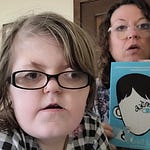


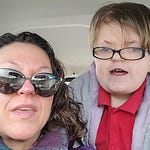
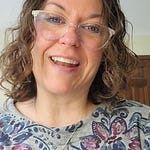
Share this post